Center for Precision Health Research Seminar Series
Event Details
The NHGRI Center for Precision Health Research (CPHR) sponsors a monthly series of talks by intramural and special guest speakers on research relevant to the use of genomic data and large-scale electronic health record information to improve health. Speakers are selected by CPHR faculty and cover research topics of interest to a wide audience.
All seminars are free and open to the public. Seminar titles and other details are updated as information becomes available. For more information, please contact Les Biesecker at email lesb@nih.gov.
Hybrid: Zoom Webinar (Requires Registration) and In-Person
Video Recordings
YouTube Playlist: CPHR Seminar Series Videos
Upcoming Seminars
Preview of the Upcoming Revised ACMG/AMP/CAP/ClinGen Variant Classification Recommendations
March 27, 2025, 4:00 to 5:00 PM ET
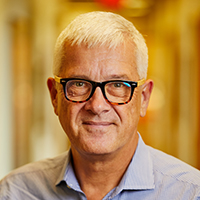
Leslie G. Biesecker, M.D.
Director and NIH Distinguished Investigator
Center for Precision Health Research
Head, Precision Genomics Section
National Human Genome Research Institute
Recommendations for variant pathogenicity classification have been issued by ACMG and affiliated organizations in 2000, 2007, and 2015. Since 2015, ClinGen has made major progress in refining the criteria, but most importantly in shifting the recommendations from expert opinion to an objective, evidence-based, quantitative framework. The new recommendations are nearing completion and pilot testing will begin soon. I will review the new framework and show examples of how the new criteria can be used to improve variant classification.
Dr. Biesecker is a clinical and molecular geneticist and is the chief of the Center for Precision Health Research at the National Human Genome Research Institute (NHGRI) of the National Institutes of Health. He uses genetic and genomic technologies to study the etiology of inherited disorders. He received his medical training at the University of Illinois, training in pediatrics at the University of Wisconsin, and in clinical and molecular genetics at the University of Michigan. His laboratory has elucidated the etiology and natural history of numerous diseases, including Proteus syndrome, PIK3CA-related overgrowth syndrome, TARP syndrome, oculofaciocardiodental syndrome, Lenz microphthalmia syndrome, McKusick-Kaufman syndrome, Bardet-Biedl syndrome, Pallister-Hall syndrome and Amish microcephaly, and has contributed to the discovery of many others. In addition, he developed the ClinSeq® program, which has consented more than 1,000 subjects for whole-genome sequencing with the interpretation and return of results. He co-directs a Clinical Laboratory Improvement Ammendments (CLIA)-certified molecular diagnostic laboratory within NHGRI.
Dr. Biesecker serves as an editor or board member for four biomedical journals, is an advisor to the Illumina Corporation and was a member of the board of directors for the American Society of Human Genetics. He served on advisory panels for the World Trade Center and Hurricane Katrina victim identification efforts. He was recently elected to the National Academy of Medicine of the National Academy of Sciences and has been elected to be the president of the American Society of Human Genetics for 2019.
Past Seminars
Gene Environment Interactions in the Personalized Environment and Genes Study
February 27, 2025, 4:00 - 5:00 PM ET
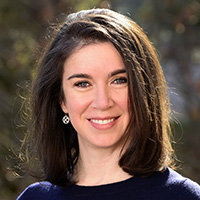
Alison Motsinger-Reif, Ph.D.
Branch Chief, Senior Investigator
Biostatistics and Computational Biology Branch
National Institute of Environmental Health Services
This talk will explore how gene-environment interactions shape disease risk using data from the Personalized Environment and Genes Study (PEGS). PEGS integrates whole genome sequencing, epigenetics, and detailed environmental exposures—including GIS-linked data—to uncover complex disease mechanisms. We will discuss challenges in detecting gene-environment interactions, methodological approaches, and recent findings on conditions such as cardiovascular disease, type 2 diabetes, and autoimmune disorders.
Identification of Treatable Genetic Disorders in Fetuses and Newborns
January 23, 2025, 4:00 - 5:00 PM ET
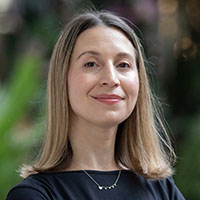
Nina Gold, M.D.
Director of Prenatal Medical Genetics
Massachusetts General Hospital
Over the past decade, genomic sequencing has become a tool for understanding the genetic underpinnings of sonographic abnormalities detected during pregnancy. However, many genetic conditions do not cause detectable physical changes, but can still have profound implications for the health of the fetus or newborn. In this talk, Dr. Gold will discuss a proposed framework for a “treatable fetal findings list,” aimed at maximizing the clinical utility of prenatal genomic testing and enhancing the autonomy of pregnant patients. To address questions about the predictive value of such a list, examples related to genomic screening among infants and adults will also be discussed.
Dr. Gold is an Assistant Professor of Pediatrics and the Director of Prenatal Medical Genetics and Director of Metabolism at Massachusetts General Hospital. Her research investigates the use of population-based genetic screening to identify treatable genetic disease across the lifespan. Her most recent work focuses on identifying genetic disorders treatable in fetuses and examining the penetrance of genomic variants associated with childhood diseases in undiagnosed adults. She received her MD from Harvard Medical School, completed a combined pediatrics and medical genetics residency at Boston Children's Hospital, and completed a fellowship in medical biochemical genetics at the Children's Hospital of Philadelphia.
Integration of Clinical-grade Optical Genome Mapping for Baseline Diagnostic Profiling of Hematologic Malignancies
October 24, 2024, 4:00 - 5:00 PM ET
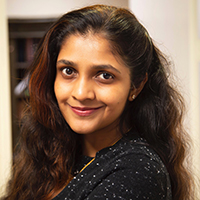
Rashmi Kanagal-Shamanna, M.D.
Hematopathologist, Molecular Genetic Pathologist, Associate Prof. and Director of Microarray
MD Anderson Cancer Center
Dr. Rashmi Kanagal-Shamanna is a practicing triple board-certified Molecular Genetic Pathologist and Hematopathologist at The University of Texas MD Anderson Cancer Center. She is a tenured Associate Professor, Co-Director of the Bone Marrow Laboratory, and the Director of the Clinical Molecular Diagnostic Laboratory (Microarray). Dr. Kanagal-Shamanna received her MD from St. John’s Medical College, Bangalore, India followed by a residency in Anatomic and Clinical Pathology at Henry Ford Hospital, Detroit, Michigan. She completed her fellowships in Hematopathology, Advanced Hematopathology, & Molecular Genetic Pathology at M.D. Anderson Cancer Center. Dr. Kanagal-Shamanna’s clinical responsibilities include the development and validation of genomic assays and clinical reporting, signing out bone marrow and lymph node biopsies among others. Her primary research interest is the application of novel tools for molecular profiling of hematological malignancies for prognosis and guiding therapy. Dr. Kanagal has >250 highly cited peer-reviewed publications in her field. She is the recipient of the Leukemia SPORE career development award, Ladies Leukemia League grant, and RP Foundation award. Dr. Kanagal is an invited lead author for the 2022 World Health Organization (WHO) Classification of Hematolymphoid Tumors, and author of the WHO Genetic Tumor Syndromes. Her work on myeloid neoplasms with isochromosome (17q) has led to the recognition of this as a provisional entity in the latest International Consensus Classification (ICC) system. Dr. Kanagal-Shamanna is the current President of the Cancer Genomics Consortium (CGC) and co-leads the Clinical Genome (ClinGen) resource’s Somatic Hematologic Malignancy Taskforce. She served as the past chair of the Professional Association Collaboration Committee tasked with the development of guidelines for the appropriate utilization of genomic assays in patient care. She serves as aneditorial board member the Cancer Genetics journal.
Investigation of RNA modifications associated with glucose stimulation in pancreatic islet β-cells
September 26, 2024, 4:00 - 5:00 PM ET
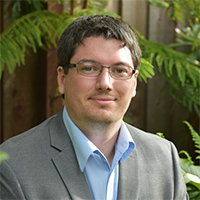
Logan Mulroney, Ph.D.
Postdoctoral Fellow at EMBL-EBI & CGS@IIT
Clinical and genetic studies highlight the central pathophysiological role of pancreatic islet β-cell dysfunction in Type 2 diabetes (T2D). However, the molecular mechanisms driving T2D in pancreatic islet β-cells remains unclear. Recent studies suggest an important role for N-6-methyladenosine (m6A) in T2D. Largely due to technical detection challenges, the impact that any other RNA modifications have not been investigated in the context of T2D. Recent advances in direct RNA nanopore sequencing (dRNA-seq) allow for direct detection of all all RNA modifications simultaneously. Here we sequenced poly(A) seleteced RNA from the human β-cell line, EndoC-bH3 grown at basal (2.8mM) and stimulated (15mM) glucose conditions. With an average of 17M reads from four replicates of each condition, we found 2643 m6A and 1522 pseudouridine RNA modifications that were significantly different after glucose stimulation. Among these, 63 m6A and 26 pseudouridines were found on transcripts previously associated with T2D. We aim to use these results to guide future large-scale studies of RNA modifications in the context of T2D.
Evolved Base Editors, Prime Editors, Recombinases, and Transposases for Targeted Gene Correction and Integration in Cells, Animals, and Patients
August 22 2024, 4:00 - 5:00 PM ET
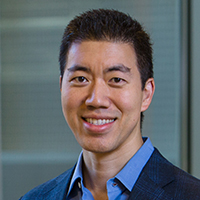
David R. Liu, Ph.D.
Richard Merkin Professor and director of the Merkin Institute of Transformative Technologies in Healthcare
Vice-chair of the faculty at the Broad Institute of MIT and Harvard
Thomas Dudley Cabot Professor of the Natural Sciences at Harvard University
Howard Hughes Medical Institute (HHMI) investigator
David R. Liu is the Richard Merkin Professor and director of the Merkin Institute of Transformative Technologies in Healthcare, vice-chair of the faculty at the Broad Institute of MIT and Harvard, the Thomas Dudley Cabot Professor of the Natural Sciences at Harvard University, and a Howard Hughes Medical Institute (HHMI) investigator. Liu’s research integrates chemistry and evolution to illuminate biology and enable next-generation therapeutics. His major research interests include the engineering, evolution, and in vivo delivery of genome editing proteins such as base editors and prime editors to study and treat genetic diseases; the evolution of proteins with novel therapeutic potential using phage-assisted continuous evolution (PACE); and the discovery of bioactive synthetic small molecules and synthetic polymers using DNA-templated organic synthesis and DNA-encoded libraries. Base editing— the first general method to perform precision gene editing without double-stranded breaks, and a Science 2017 Breakthrough of the Year finalist — as well as prime editing, PACE, and DNA-templated synthesis are four examples of technologies pioneered in his laboratory. These technologies are used by thousands of labs around the world and have enabled the study and treatment of genetic diseases. At least nine base editing clinical trials are already underway to treat diseases including two types of leukemia, hypercholesterolemia, sickle-cell disease, and beta-thalassemia, and the first clinical benefits of both ex vivo and in vivo base editing — including young T-cell leukemia patients whose lives were saved by base editing—have been reported. The first clinical trial using prime editing has been cleared by FDA to proceed, using prime editing to treat chronic granulomatous disease
Liu graduated first in his class at Harvard College in 1994. During his doctoral research at UC Berkeley, Liu initiated the first general effort to expand the genetic code in living cells. He earned his PhD in 1999 and became assistant professor of chemistry and chemical biology at Harvard University in the same year. He was promoted to associate professor in 2003 and to full professor in 2005. Liu became a Howard Hughes Medical Institute investigator in 2005 and joined the JASONs, academic science advisors to the U.S. government, in 2009. In 2016 he became a Core Institute Member and Vice-Chair of the Faculty at the Broad Institute of MIT and Harvard, and Director of the Chemical Biology and Therapeutics Science Program.
Liu has published more than 260 papers and is the inventor on more than 100 issued U.S. patents. Liu has been elected to the U.S. National Academy of Sciences, the U.S. National Academy of Medicine, and the American Association for the Advancement of Science. He is the 2022 King Faisal Prize Laureate in Medicine. He has earned several University-wide distinctions for teaching at Harvard, including the Joseph R. Levenson Memorial Teaching Prize, the Roslyn Abramson Award, and a Harvard College Professorship. His research accomplishments have earned distinctions including the ASGCT Outstanding Achievement Award, the Ian Scott Medal for Excellence in Biological Chemistry Research, the Ronald Breslow Award for Biomimetic Chemistry, the American Chemical Society David Perlman Award, ACS Chemical Biology Award, the American Chemical Society Pure Chemistry Award, the Arthur Cope Young Scholar Award, the NIH Marshall Nirenberg Lecturer, and awards from the Sloan Foundation, Beckman Foundation, NSF CAREER Program, and Searle Scholars Program.
In 2016, 2019, 2020, and 2021 he was named one of the Top 20 Translational Researchers in the world by Nature Biotechnology, and was named one of Nature’s 10 researchers in world. Liu was named as a leading global thinker by the Foreign Policy Leading Global Thinkers in 2017, to the STATUS List of 46 leaders in health, medicine, and science by STAT News, and as one of the "Most Influential People in Biopharma in 2023" by Fierce Biotech. Liu is the founder or co-founder of several public and private biotechnology and therapeutics companies, including Beam Therapeutics, Prime Medicine, Editas Medicine, Pairwise Plants, Chroma Medicine, Exo Therapeutics, and Nvelop Therapeutics.
Outside of the lab, Liu pursues a variety of hobbies at the intersection of science and art, including photography around the world, raising large bonsai trees indoors under LED light canopies he designed, creating art from wood, metal, stone, and/or electronic components, and painting.
PennChart Genomics Initiative at Five Years: From Integration to Implementation
July 25 2024, 5:00 - 6:00 PM ET
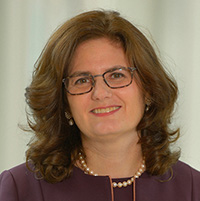
Katherine L. Nathanson, M.D.
Pearl Basser Professor of BRCA-Related Research Director, Penn Medicine Center for Genomic Medicine
Deputy Director, Abramson Cancer Center
Katherine (Kate) L. Nathanson, MD, is the Pearl Basser Professor for BRCA-Related Research in the Department of Medicine, Division of Translational Medicine and Human Genetics, and Department of Genetics, at the Perelman School of Medicine of the University of Pennsylvania, Deputy Director of the Abramson Cancer Center, Director of the Penn Medicine Center for Genomic Medicine, and Director of Genetics for the Basser Center for BRCA. She is an internationally recognized for both her clinical and research expertise in cancer genetics/genomics.
Her research focuses on both inherited susceptibility to cancer and somatic genetic characterization of tumors, with interests across multiple tumor types, including testicular germ cell tumors, hereditary breast and ovarian cancers, melanoma and neuroendocrine tumors.
She has led studies leading to important insights in all these cancer types, playing critical roles in genotype-phenotype studies in multiple genes underlying hereditary breast and ovarian cancer, leading studies to understand the molecular features and immune profile of tumors associated with BRCA1/2 mutations, and the seminal studies elucidating genetic variation leading to testicular cancer susceptibility and the underlying disrupted pathways, as the leader of the Testicular Cancer Consortium (TECAC).
Dr. Nathanson has published over 400 peer-reviewed articles in journals such as Nature, JAMA, New England Journal of Medicine and Cancer Cell. Dr. Nathanson has an extensive record of national service, serving on committees for multiple organizations, such as ACMG and AACR, several editorial boards, and scientific review committees, and served as Chair of the Cancer Genetics study section for the National Institutes of Health. She has received multiple awards.
Genetic Equity: Breaking Barriers for Children with Rare Diseases at the Texas-Mexico Border
June 27, 2024, 5:00 - 6:00 PM ET
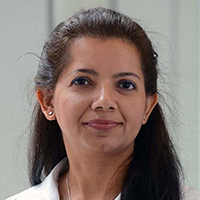
Seema R. Lalani, M.D.
Professor, Department of Molecular and Human Genetics
Baylor College of Medicine
Identifying genetic diagnoses in children is crucial for improving health outcomes, yet genomic disparities exist for individuals who are non-White and/or Hispanic or those with lower socioeconomic status. The Rio Grande Valley (RGV) along the Texas-Mexico border lacks consistent access to a full-time genetics provider. Over 94% of the RGV population identifies as Hispanic/Latino, and between 30-40% of children in the four counties live in poverty. Many families in this region travel between 150-350 miles to access genomic services. Project GIVE (Genetic Inclusion by Virtual Evaluation) is an NIH-funded research study at Baylor College of Medicine that leverages Consultagene, a cutting-edge telehealth platform, to provide timely virtual genetic evaluation and whole genome sequencing (WGS) to children in the RGV with suspected genetic diseases.
Uncovering fetal genetic disease: a focus on non-immune hydrops fetalis
May 23, 2024, 5:00 - 6:00 PM ET
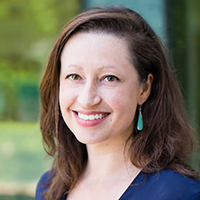
Teresa Sparks, M.D., MAS
Associate Professor, Maternal-Fetal Medicine and Clinical Genetics
Program Director, Maternal-Fetal Medicine Fellowship
Co-Director, Women's Reproductive Health Research/K12 Program
Division of Maternal-Fetal Medicine and Reproductive Genetics
University of California, San Francisco
Dr. Teresa Sparks is an Associate Professor at UCSF who specializes in both Maternal-Fetal Medicine and Clinical Genetics. In her clinical practice, Dr. Sparks cares for individuals through the Prenatal Diagnosis Center and the Fetal Treatment Center who are pregnant or considering pregnancy, particularly those that are higher risk due to fetal birth defects, fetal genetic diseases, and maternal genetic as well as non-genetic diseases. Dr. Sparks is the Program Director for the Maternal-Fetal Medicine Fellowship at UCSF and is an active mentor for many post-graduate students, residents, and fellows. In her role as a physician scientist, Dr. Sparks oversees an active NICHD-funded research program focused on non-immune hydrops fetalis, is an Investigator for the UCSF Center for Maternal-Fetal Precision Medicine, serves as Co-Director of the NICHD-funded Women's Reproductive Health Research (WRHR)/K12 Program at UCSF, and serves as the alternate PI for the NICHD-funded Maternal-Fetal Medicine Units (MFMU) Network award at UCSF. Her overall research goals are to uncover the full breadth of genetic diseases underlying non-immune hydrops fetalis, characterize genotype-phenotype relationships for genetic diseases that present in the fetal period, develop a precision-based approach to care for non-immune hydrops fetalis and other fetal anomalies, and work toward the development of novel in utero treatment approaches for fetal genetic diseases.
Universal Exome Sequencing in Critically Ill Adults: A Diagnostic Yield of 25% and Race-Based Disparities in Access to Genetic Testing
April 25, 2024, 5:00 - 6:00 PM ET
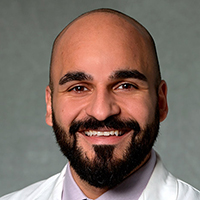
Theodore G. Drivas, M.D. Ph. D.
Clinical Geneticist / Assistant Professor of Medicine
Translational Medicine and Human Genetics
University of Pennsylvania
Assistant Director of Scientific Outreach
Penn Medicine BioBank
Teddy Drivas is a Clinical Geneticist and an Assistant Professor of Medicine at the University of Pennsylvania in the Division of Translational Medicine and Human Genetics where he serves as the Assistant Director of Scientific Outreach for the PennMedicine BioBank. Through his clinical work, focusing on the care of adult patients with known or suspected genetic conditions, he has established himself as a dedicated advocate for the advancement of genetic testing in adult populations to improve patient outcomes and combat disparities and inequities in genetic medicine. Outside of the clinic, the Drivas Lab is engaged in pioneering research at the intersection of common and rare disease genetics, leveraging the latest in informatic, molecular, and translational research techniques to elucidate the complex genetic architecture that underlies human disease. The lab focuses on identifying and validating genetic pathways and interactions that act together to perturb fundamental cellular processes important to human health, with a particular focus on the complex cellular organelle known as the primary cilium, and its involvement in both rare syndromic and common complex disease pathogenesis.
Clinical and Research Strategies to Support Genomic Medicine
March 28, 2024, 5:00 - 6:00 PM ET
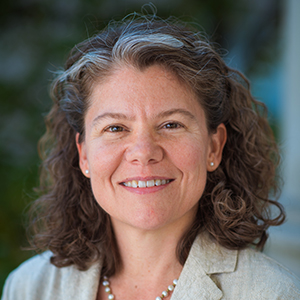
Heidi Rehm, Ph.D.
Institute Member, Co-director of the Program in Medical and Population Genetics
BROAD Institute
Heidi Rehm, a human geneticist and genomic medicine researcher, is co-director of the Program in Medical and Population Genetics and an institute member at the Broad Institute. She is the chief genomics officer in the Department of Medicine at Massachusetts General Hospital (MGH), working to integrate genomics into medical practice with standardized approaches. She is also a professor of pathology at Harvard Medical School and faculty member of the Center for Genomic Medicine at MGH.
As a board-certified laboratory geneticist and medical director of the Clinical Research Sequencing Platform, she is guiding genomic testing for clinical and clinical research use. She is a leader in defining standards for the interpretation of sequence variants and a principal investigator of a major NIH-funded effort called ClinGen (Clinical Genome Resource), providing free and publicly accessible resources to support the interpretation of genes and variants.
Rehm also co-leads the Broad Center for Mendelian Genomics with Anne O’Donnell-Luria focused on discovering novel rare disease genes and co-leads the Matchmaker Exchange to aid in gene discovery. She is a strong advocate and pioneer of open science and data sharing, working to extend these approaches through her role as a vice chair of the Global Alliance for Genomics and Health. Rehm is also a principal investigator of the Broad-LMM-Color All of Us Genome Center, supporting the sequencing and return of results to a cohort of one million individuals in the U.S. and co-leading gnomAD, the Genome Aggregation Database.
Rehm is a board member of the American College of Medical Genetics and Genomics and the National Library of Medicine. She serves as an editor of the Cold Spring Harbor Molecular Case Studies journal and as an associate editor of the American Journal of Human Genetics.
Last updated: March 18, 2025
